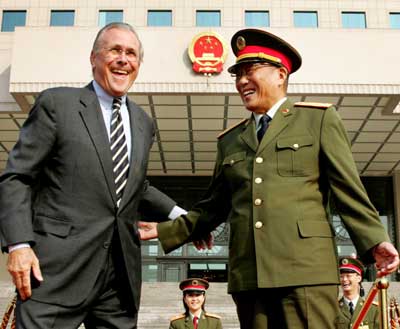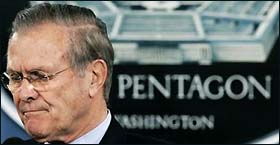
WASHINGTON, DC, United States (UPI) -- The strategic significance for Asia of the nuclear cooperation deal signed with India last week in New Delhi by U.S. President George W. Bush was underlined Saturday by the announcement that China`s military budget for the coming year will rise by almost 15 percent
The new Chinese budget comes after the publication last month of the Pentagon`s Quadrennial Defense Review, which described the new priorities of the U.S. military as preparing to conduct a 'long war' against terrorists worldwide, to improve homeland security capabilities, and to prepare for possible confrontation with China as an emerging superpower rival.

As angry rioters across the Muslim world continue to express their outrage at the despicable cartoon depiction of Prophet Muhammad in several European newspapers, the US Department of Defense released what it calls the Quadrennial Defense Review (QDR), which is mandated every four years by the Congress and is an important document outlining how the US will deal with major security challenges in the future. Interestingly, the document opens with the words: “The US is a nation engaged in what will be a long war” and differs from the 2001 review in that it calls for US forces to be able to “operate around the globe” and not only in Europe, the Middle East, and parts of Asia as the previous review had suggested.
The review marks a clear shift from the Pentagon’s traditional emphasis on conventional warfare techniques against nation states and concentrates on defeating “terrorist” networks, countering nuclear, chemical, and biological threats, and dissuading rising powers such as Russia, India, and China from becoming adversaries. It stipulates an expansion in clandestine operations performed by US Special Operations Forces (SOF) which should “have the capacity to operate in dozens of countries simultaneously,” operate in “politically sensitive environments,” and deploy for longer periods to foment relationships with foreign military and security forces.
 AT AT ATTAT ATATT
AT AT ATTAT ATATTIn addition, US Secretary of Defense, Donald Rumsfeld, explained his country’s defense posture at a speech at the 42nd Munich Conference on Security Policylaying out his country’s military and political agenda for the upcoming years. Rumsfeld took a conciliatory tone towards Europe and urged unity in the face of “terrorism” and weapons proliferation. More controversial, however, were his comments in which he accused Iran of being the worst sponsor of terrorism and denied that his country’s invasion of Iraq was a catalyst for “terrorism”. Instead, Rumsfeld accused the “terrorists” of using Iraq as a base for training and recruitment operations as part of what he suggests is an overall Islamist scheme aiming at the establishment of an Islamic caliphate. The Munich Conference on Security Policy represents the security equivalent of the Davos-based World Economic Forum, and is an important annual venue where representatives of the international security community exchange views on the development of transatlantic relations as well as European and global security. Prior to the conference, there were doubts that Rumsfeld would attend the conference due to the fact that the New York-based Center for Constitutional Rights had filed a lawsuit with German federal prosecutors in November 2005 charging that US officials, including Rumsfeld, were responsible for war crimes and acts of torture.

No comments:
Post a Comment